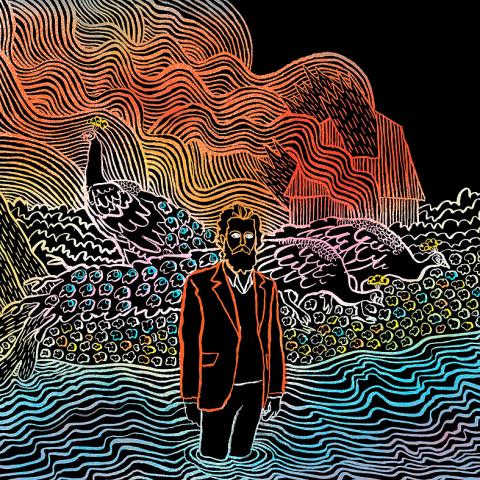James Blake’s four previous EP releases, which date back to 2009, have all been lauded by music critics, who see him as a logical next step in the evolution of singer-songwriters.
On his eponymous debut album, Blake shows that the collective enthusiasm is not without warrant. The music bridges a gap between electronic experimentalism and traditional pop music. The digital manipulation of analog instrumentation is nothing new, of course, but the balance usually tips one way or the other, coming across either as a pop musician toying with electronics or an electronic musician toying with pop constructs. Here, however, Blake has produced an organic mix of both worlds.
Warbly basslines, piped beneath the enchanting piano and vocals that form the backbone of the record, find a new context in which to breathe, far removed from their traditional home within dub and jungle.

I Never Learnt to Share is one of the album’s truly standout tracks. “My brother and my sister don’t speak to me/but I don’t blame them,” Blake sings, over and over, his voice expertly processed and layered on top of itself, driven forward by minimalist percussion and warm synths that build to an unnerving crescendo of anxiety before dropping into a nasty, heavily compressed bass riff.
The gorgeous I Mind is Blake at his best, juggling a variety of sounds — high-pitched emotive crooning, subterranean bass, static white wash, and dizzying synth textures — all with arresting acumen. James Blake is a special record, one that may offer a glimpse of electronic music’s future.
Cape Dory, the debut record of Tennis — a husband and wife duo from Denver, Colorado — utilizes some rather unusual source material. The couple saved money for a sailboat and went on a sailing adventure together, deciding along the way that the best way to record their experience was with song. If you’re like me, you may have just vomited a little in your mouth, but the net result of their efforts is an album of whimsical surf-styled pop that is surprisingly rich and accessible.

The indie-beach-pop thing has been gaining traction for some time now, perhaps best epitomized by Best Coast, to whom Tennis will inevitably be compared. And although there are some rather obvious superficial similarities between the two bands — namely the heavily reverbed sparkling guitars and 1950s girl-group vocal stylings — Best Coast has a punky edge that Tennis completely sidesteps, instead emphasizing the pop side of what it does.
Album opener Bimini Bay sets the tone with a carefully measured dose of languid, dreamy pop, putting on proud display the band’s immediately obvious strengths: Alaina Moore’s doo-wop vocals, which link unabashed joy with melancholic self-reflection; the lovely lo-fi guitar tones of Patrick Riley (Moore’s husband, not the former Los Angeles Lakers coach); and a marvelous sense of how to construct a sticky sweet pop song that nonetheless holds your interest.
On Baltimore, the band strikes an emotional balance between the love of freedom and the fear of its price. The song consists of a clever, buoyant bass riff atop which Moore begs the question “Can we get a job?”, with simple circular melodies providing a sense of aimless drifting that lengthy journeys often produce.

The record is a bit too precious for its own good in places, but this is only likely to further endear it to fans.
Iron and Wine is regarded as one of the better indie acts of the past decade. In that time, Samuel Beam (the man behind the moniker) has followed the path blazed by so many other singer-songwriters before him: He’s gone from quiet, solo acoustic ballads to brash, cocky full band arrangements. The success of such a progression varies, but in Beam’s case, he has thus far managed to avoid straying into dangerous waters.
His latest release, Kiss Each Other Clean, sees him on safe ground while branching out as a vocalist. Hushed deliveries seem a thing of the past. Beam frequently belts out intricate, passionate melodies, as on Monkeys Uptown, which sees the musician accompanied by a roaming melodic bass, a drum machine and a nasal electric guitar as he sings with a note of venom: “And it’s looking like you better do what they say/Those monkeys uptown, they told you not to fuck around.”

Big Burned Hand provides some funky relief, with low-pass enveloped bass synths and scratchy guitar tones that call to mind Stevie Wonder. It isn’t a bad sound, but Beam’s music works best within the quieter arrangements that marked his arrival on the music scene.
As a result, Kiss Each Other Clean is not the sort of album that is likely to blow any minds. It is, instead, a collection of songs that sound like other songs you’ve heard before, carefully wrought and well-executed but lacking the definitive edge that distinguishes great records from good ones.
ESG is a band you’ve probably heard before, even if you’ve never heard the name. It is one of the most heavily sampled bands of all-time, with Tricky, Beastie Boys, DJ Shadow, Big Daddy Kane and Wu-Tang Klan among those who have included ESG in their song credits. Not too bad for a group of sisters who were given instruments by their mother only to keep them out of trouble. Dance to the Best of ESG is a two-disc compilation record that offers a comprehensive selection of the band’s best work.
It’s easy to hear why ESG is so imminently sampleable: By stripping their sound down to its barest essence, the group offers other artists fertile ground to build upon. Sparse, deceptively complex rhythms, groovy basslines and tasteful, spacey guitar licks are the hallmarks of the band’s music. ESG’s straightforwardness is its biggest charm: There is no need for slick musicianship and high production values.
UFO, with an echo-drenched, dissonant guitar, lumbering bassline and snappy snare, channels a feeling akin to that of cheesy 1960s sci-fi films, while Dance offers something with broader pop appeal — an infectiously funky bass-hook, shimmying shakers, and a clap track thrown in as a bonus. The vocals are far from accomplished and actually rather snotty at times, but they do have a certain charm about them, akin to punkish rebellion.
With the recent flurry of 1980s throwbacks and danceable indie-rock bands, it would come as no surprise if ESG managed to find a new audience among the hipsters now spinning vinyl at rock ’n’ roll clubs.

In the March 9 edition of the Taipei Times a piece by Ninon Godefroy ran with the headine “The quiet, gentle rhythm of Taiwan.” It started with the line “Taiwan is a small, humble place. There is no Eiffel Tower, no pyramids — no singular attraction that draws the world’s attention.” I laughed out loud at that. This was out of no disrespect for the author or the piece, which made some interesting analogies and good points about how both Din Tai Fung’s and Taiwan Semiconductor Manufacturing Co’s (TSMC, 台積電) meticulous attention to detail and quality are not quite up to

April 21 to April 27 Hsieh Er’s (謝娥) political fortunes were rising fast after she got out of jail and joined the Chinese Nationalist Party (KMT) in December 1945. Not only did she hold key positions in various committees, she was elected the only woman on the Taipei City Council and headed to Nanjing in 1946 as the sole Taiwanese female representative to the National Constituent Assembly. With the support of first lady Soong May-ling (宋美齡), she started the Taipei Women’s Association and Taiwan Provincial Women’s Association, where she

Chinese Nationalist Party (KMT) Chairman Eric Chu (朱立倫) hatched a bold plan to charge forward and seize the initiative when he held a protest in front of the Taipei City Prosecutors’ Office. Though risky, because illegal, its success would help tackle at least six problems facing both himself and the KMT. What he did not see coming was Taipei Mayor Chiang Wan-an (將萬安) tripping him up out of the gate. In spite of Chu being the most consequential and successful KMT chairman since the early 2010s — arguably saving the party from financial ruin and restoring its electoral viability —

It is one of the more remarkable facts of Taiwan history that it was never occupied or claimed by any of the numerous kingdoms of southern China — Han or otherwise — that lay just across the water from it. None of their brilliant ministers ever discovered that Taiwan was a “core interest” of the state whose annexation was “inevitable.” As Paul Kua notes in an excellent monograph laying out how the Portuguese gave Taiwan the name “Formosa,” the first Europeans to express an interest in occupying Taiwan were the Spanish. Tonio Andrade in his seminal work, How Taiwan Became Chinese,